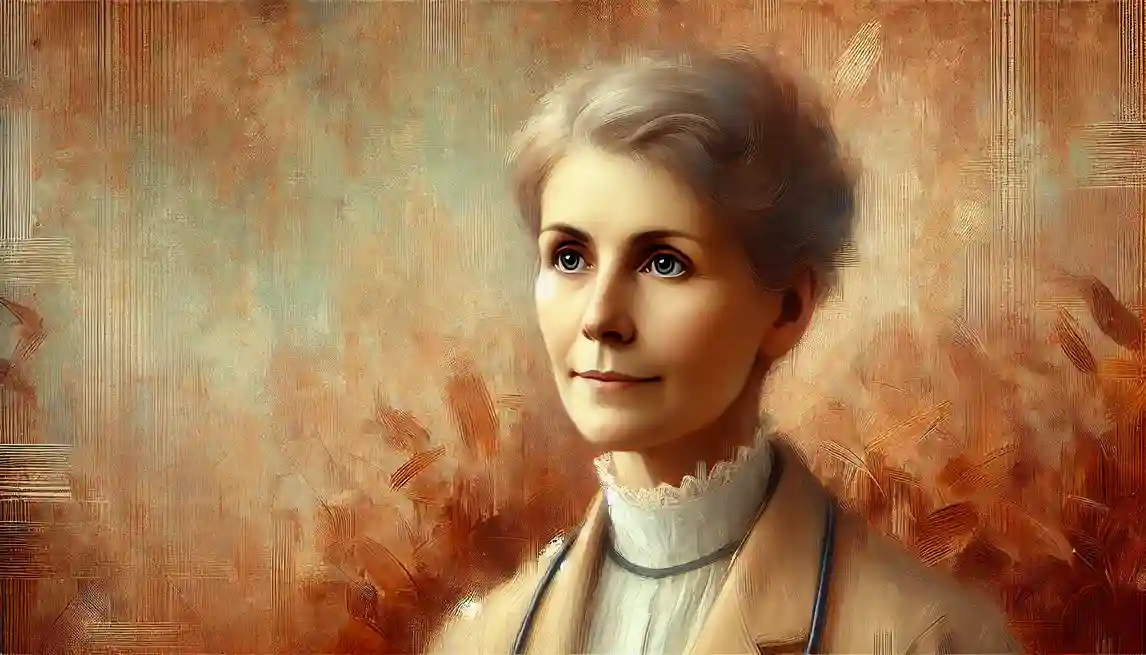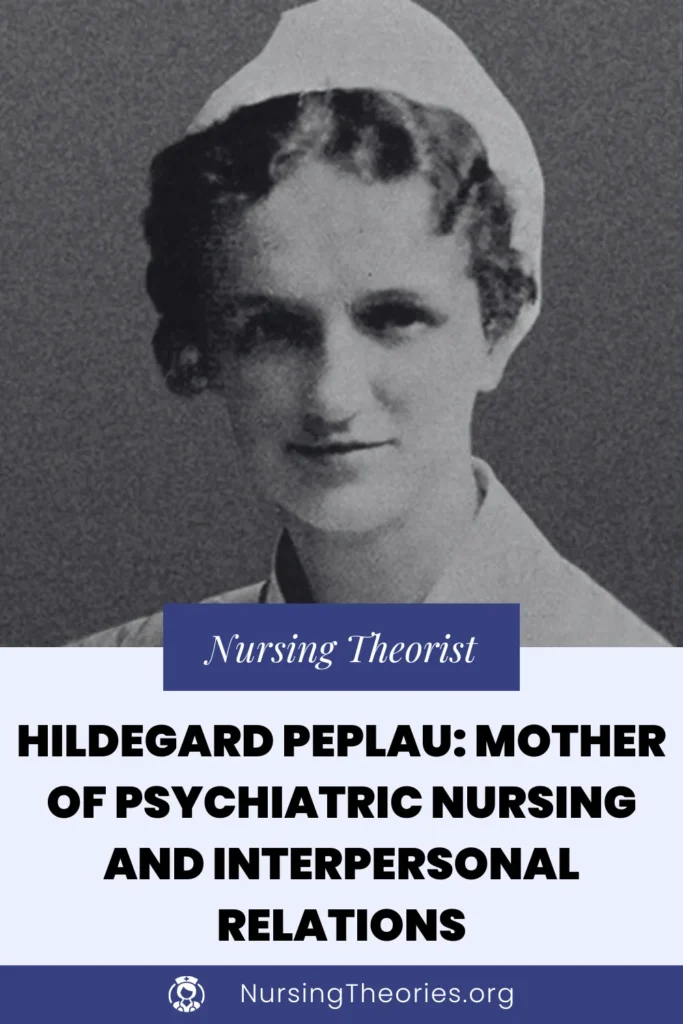Hildegard Peplau, a pioneering nurse theorist and educator, is widely known as the “Mother of Psychiatric Nursing” for her groundbreaking contributions to mental health nursing through the development of the Interpersonal Relations Theory.
Her theory focuses on the therapeutic relationship between nurses and patients, emphasizing communication and collaboration as essential to the healing process.
By reshaping the role of nurses in psychiatric care, Peplau’s work remains an integral part of modern nursing practice, education, and research.
In this article, we cover Hildegard Peplau’s life, achievements, philosophy, and lasting impact on modern nursing.

Quick Summary
- Developed the Interpersonal Relations Theory, focusing on the nurse-patient relationship as a therapeutic tool.
- Revolutionized psychiatric nursing by emphasizing communication and patient involvement.
- Authored Interpersonal Relations in Nursing, a foundational text in psychiatric nursing.
- Played a key role in integrating mental health principles into general nursing practice.
- Recognized globally for her contributions to mental health nursing and education.
Early Life and Background of Hildegard Peplau

Birth and Family Background of Hildegard Peplau
- Hildegard E. Peplau was born on September 1, 1909, in Reading, Pennsylvania, into a working-class family.
- Her upbringing in a close-knit community fostered her sense of empathy and understanding of human behavior, which would later influence her work in psychiatric nursing.
Education and Early Influences in Peplau’s Life
- Peplau began her nursing education at Pottstown Hospital School of Nursing, graduating in 1931.
- She furthered her studies with a bachelor’s degree in interpersonal psychology from Bennington College and a master’s degree in psychiatric nursing from Teachers College, Columbia University.
- Her experience working with soldiers during World War II shaped her understanding of the psychological needs of patients, leading her to focus on mental health nursing.
Hildegard Peplau’s Philosophy and Vision for Nursing
- Peplau believed that nursing is more than performing tasks; it involves fostering a therapeutic relationship that can promote healing.
- Her vision emphasized the role of nurses as active participants in the healing process, guiding patients toward recovery through communication and collaboration.
- Famous quote: “Nursing is an interpersonal process because it involves interaction between two or more individuals with a common goal.”
Hildegard Peplau’s Education and Early Nursing Career
Formal Education and Nursing Training of Hildegard Peplau
- Peplau earned her nursing diploma before pursuing advanced studies in psychology and psychiatric nursing.
- She also completed postgraduate work in mental health at various institutions, further developing her expertise in psychiatric care.
Early Professional Experiences in Peplau’s Career
- Peplau worked as a staff nurse and later as a military nurse during World War II, where she treated soldiers dealing with psychiatric trauma.
- Her clinical experiences highlighted the importance of understanding patient behavior and communication in mental health treatment.
Key Achievements and Contributions of Hildegard Peplau
Development of the Interpersonal Relations Theory
- Peplau’s Interpersonal Relations Theory describes the nurse-patient relationship as a dynamic and interactive process consisting of four phases:
- Orientation: The nurse and patient meet and identify the patient’s needs.
- Identification: The patient begins to feel understood and supported by the nurse.
- Exploitation: The patient takes advantage of the nurse’s knowledge to address their health issues.
- Resolution: The therapeutic relationship ends as the patient’s needs are met.
- The theory highlights the importance of effective communication, empathy, and trust in promoting patient recovery.
Contributions to Psychiatric Nursing Education
- Peplau transformed psychiatric nursing curricula by integrating communication techniques and interpersonal skills as core components of training.
- She emphasized the role of nurses in helping patients gain insight into their behavior and develop coping mechanisms.
Research and Theoretical Advancements
- Peplau conducted research on the psychological and emotional dimensions of nursing care, demonstrating that effective nurse-patient relationships lead to improved outcomes.
- Her work laid the foundation for the development of therapeutic communication as a key skill in nursing practice.
Global Impact and Recognition
- Peplau’s theory has been adopted in mental health and general nursing practices worldwide, influencing nurse-patient interactions across diverse settings.
- She received numerous awards and honors, including induction into the American Nurses Association Hall of Fame.
Overview of Hildegard Peplau’s Interpersonal Relations Theory
- The theory focuses on the dynamic interaction between nurses and patients, emphasizing that the relationship itself is therapeutic.
- By understanding patients’ needs and fostering open communication, nurses can guide patients toward improved mental and physical well-being.
- To explore this theory in greater depth, visit the in-depth article on the Interpersonal Relations Theory.
Notable Publications by Hildegard Peplau
- Interpersonal Relations in Nursing – A foundational text that outlines her theory and its applications in psychiatric care.
- Psychiatric Nursing for the Whole Person – A book emphasizing holistic care in mental health nursing.
- Numerous journal articles on therapeutic communication and nurse-patient relationships.
Challenges and Criticisms of Hildegard Peplau’s Work
Challenges in Implementing the Theory
- Some nurses and educators have found it challenging to fully implement the theory in fast-paced or resource-limited environments.
- Peplau advocated for training programs that teach nurses how to integrate interpersonal skills into daily practice.
Criticisms of the Theory’s Focus on Communication
- Critics have argued that the theory’s emphasis on communication may not fully address complex medical conditions.
- However, proponents highlight that effective communication often leads to better diagnosis, treatment adherence, and patient satisfaction.
Timeline of Major Milestones in Hildegard Peplau’s Life
- 1909: Born in Reading, Pennsylvania.
- 1931: Graduated from Pottstown Hospital School of Nursing.
- 1940s: Worked as a military nurse during World War II.
- 1952: Published Interpersonal Relations in Nursing.
- 1970s: Played a key role in developing psychiatric nursing curricula.
- 1994: Inducted into the American Nurses Association Hall of Fame.
Legacy and Lasting Impact of Hildegard Peplau
Impact on Nursing Practice and Patient Care
- Peplau’s theory transformed the role of nurses, emphasizing therapeutic relationships as essential to patient care.
Global Influence and Recognitions
- Her work has influenced nursing standards and mental health practices worldwide.
- Peplau’s contributions have earned her numerous awards and international recognition as a leader in psychiatric nursing.
Final Years and Passing of Hildegard Peplau
- Peplau continued to mentor nursing students and contribute to research until her passing in 1999.
- Her legacy lives on through the widespread application of her theory in psychiatric and general nursing practice.
Key Lessons from Hildegard Peplau for Modern Nursing
- Therapeutic communication: Effective communication is key to fostering healing and trust in patients.
- Patient-centered care: Involving patients in their care plans leads to better outcomes.
- Holistic approach: Addressing patients’ emotional and psychological needs is just as important as treating physical symptoms.
- Nurse-patient relationships: Building trusting relationships is a core component of successful nursing practice.
- Continuous education: Ongoing learning and skill development are crucial to improving mental health care.
Conclusion
Hildegard Peplau’s Interpersonal Relations Theory redefined the nurse-patient relationship by emphasizing the role of communication and collaboration in healing.
Her work, explored further in the in-depth article on the Interpersonal Relations Theory, continues to guide nurses in delivering patient-centered, holistic care.
Peplau’s legacy endures as her contributions remain central to psychiatric nursing and therapeutic communication worldwide.



